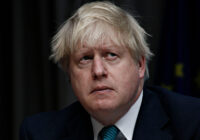In the Old West, they branded cattle. Today they brand politicians. Boris Johnson opens up to reveal his brand to the world.
Even those who don’t follow the intricacies of post-Brexit British politics know the name and possibly the image of Boris Johnson. Like Donald Trump, the former mayor of London, ex-foreign secretary, one-time journalist and author of popular history lives under a consciously cultivated, highly symbolic mass (or, in his case, mess) of blond hair. Also like Trump, Johnson allows himself to appear as a public clown, but with serious (if not sometimes sinister) intentions. Both men allow themselves “to boldly go where no [political] man has gone before.”
It has now been revealed — for those who have persisted in believing that Johnson is, like the rest of us, a living and breathing, mortal human being — that one of his political colleagues, “a senior Tory,” has set the record straight: “Boris is a brand. He defies all logic. He can do things that other politicians can’t.”
The physical human being, Boris Johnson may one day die, but as he has achieved the status of brand, he may prove immortal, just like Coca-Cola (thanks to its carefully protected and mysterious formula) and Winnie the Pooh (thanks to Disney’s legal maneuvering and aggressive merchandising).
Here is today’s 3D definition:
Brand:
An attribute of manufactured products (including public figures and, more recently, politicians) vying to become leaders in their marketplace with a status that puts them on a mythical plane in comparison to their competitors
Contextual note
There aren’t many politicians who succeed in casting off their humanity to become features of hyperreality. Trump has proved himself the leader and implicit model, but his secret formula was to achieve hyperreality long before taking a crack at politics. In doing so, he confirmed what Ronald Reagan’s election in 1980 presaged: that hyperreality could one day become the norm in politics. One of the difficulties before the age of Trump and Johnson was the implicit expectation of the public that their political leaders, even when meticulously programmed by their parties or donors, would appear to be normally functioning human beings. As an actor, Reagan consummately played that role, following the political script.
Being a brand puts Johnson beyond scandal or the effects of his own glaring mistakes. Over the past weekend, he received what an American baseball batter would call two quick strikes, knowing that one more and he heads for the dugout. Johnson appears unfazed by the breaking news of his divorce at a particularly delicate moment in the Brexit maneuverings, followed by the scandal of his provocative article comparing the tactics of Prime Minster Theresa May’s Brexit to a suicide vest whose detonator has been placed in the hands of Europe’s Michel Barnier.
Historical note
In his most recent book, historian Yuval Harari writes: “Branding often involves retelling the same fictional story again and again, until people become convinced it is the truth.” The pioneers of political branding were the totalitarian leaders of the 20th century: Adolf Hitler, Joseph Stalin and Benito Mussolini. Harari quotes Mein Kampf: “The most brilliant propagandist technique will yield no success unless one fundamental principle is borne in mind constantly — it must confine itself to a few points and repeat them over and over.” He also cites Joseph Goebbels: “A lie told once remains a lie, but a lie told a thousand times becomes the truth.”
Johnson’s “fictional story” told “again and again” is none other than Johnson himself, the man who sought to become a brand, or rather the product who became confused with his own packaging. He’s the ultimate Brexiteer, far more compelling than Nigel Farage, perceived as the bloke most xenophobic Brits and even some non-xenophobes would love to share a pint with at the local. No one would want to spend time at the pub with Boris. You don’t hang out with a brand.
Brands increasingly dominate elections. A lot of Brexiteers will automatically vote for the name Boris Johnson if it appears on a ballot, because they recognize the brand. Many might hesitate to even consider voting for Farage if they thought he could become prime minister.
Politics itself has become hyperreal ever since “scientific” political marketing became the driver, defining the targeting and content of campaigns. Parties were the brand until “discontent” became the norm in our democracies. Johnson is not only a name in the Conservative Party, meaning voters believe he can be trusted to make “responsible decisions.” He is also the only politician in Britain who realizes the force of hyperreality and is intent on exploiting its dynamics of discontent.
One of his Conservative critics, Dominic Grieve, while demolishing the political and economic pseudo-logic of Johnson’s political position, described the article containing Boris’ provocative metaphor of the suicide vest as “entirely in character: crude but, for some, entertaining populist polemic.”
In our increasingly hyperreal world, entertainment trumps everything else, leaving the very idea of truth and reality in a ditch along the side of the road. Crude is entertaining. Lucid observers have remarked that the vaunted news of our “free press” has evolved into pure entertainment. It simply uses the subject matter of current events (including entertainment) to seduce an audience that has voluntarily put to sleep its critical faculties.
*[In the age of Oscar Wilde and Mark Twain, another American wit, the journalist Ambrose Bierce, produced a series of satirical definitions of commonly used terms, throwing light on their hidden meanings in real discourse. Bierce eventually collected and published them as a book, The Devil’s Dictionary, in 1911. We have shamelessly appropriated his title in the interest of continuing his wholesome pedagogical effort to enlighten generations of readers of the news.]
The views expressed in this article are the author’s own and do not necessarily reflect Fair Observer’s editorial policy.
Support Fair Observer
We rely on your support for our independence, diversity and quality.
For more than 10 years, Fair Observer has been free, fair and independent. No billionaire owns us, no advertisers control us. We are a reader-supported nonprofit. Unlike many other publications, we keep our content free for readers regardless of where they live or whether they can afford to pay. We have no paywalls and no ads.
In the post-truth era of fake news, echo chambers and filter bubbles, we publish a plurality of perspectives from around the world. Anyone can publish with us, but everyone goes through a rigorous editorial process. So, you get fact-checked, well-reasoned content instead of noise.
We publish 2,500+ voices from 90+ countries. We also conduct education and training programs
on subjects ranging from digital media and journalism to writing and critical thinking. This
doesn’t come cheap. Servers, editors, trainers and web developers cost
money.
Please consider supporting us on a regular basis as a recurring donor or a
sustaining member.
Will you support FO’s journalism?
We rely on your support for our independence, diversity and quality.






